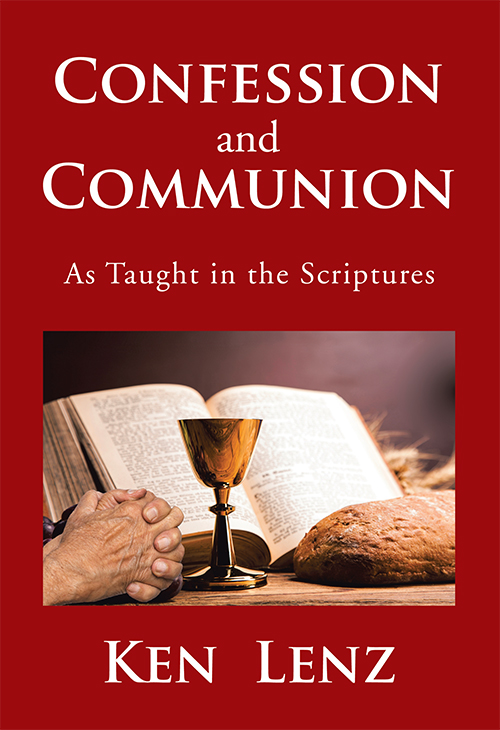How could we ever hope to have fellowship or “communion” with a holy and righteous God? Such a possibility is humanly impossible! Yet God in His love, mercy and grace provided a way — through the atoning sacrifice of His Son. When we come to God in repentant faith He reconciles us to Himself, as sons and daughters, and indwells us by His Spirit. And yet subsequent sin breaks the fellowship in that relationship: not from God’s end, but from ours! Confession is the only way to restore that communion with God.
Confession and Communion — can there be any more important aspects in the Christian life than confession of sin and communion with God? Indeed, our communion with God requires that we first confess our sins. But to whom should we confess our sins? And what is the basis through which we can be forgiven? Before partaking of the communion elements, what does Scripture mean by “examining” ourselves? And do we simply partake in remembering Christ, or are we also receiving Him — and perhaps even re-presenting His sacrifice? These and many other questions are fully answered in this book.
This book is unique in the following ways:
- This book offers a thoroughly biblical understanding of all New Testament passages that relate to the Christian ordinance of communion and the practice of confession.
- This book challenges unbiblical teachings and practices specifically on these two subjects.
- The two subjects of confession and communion are interrelated to each other in this book in a way that is not presented in any other book.
Would you like your life to be characterized as a life of confession to God and communion with God? If so, this book is for you!
The book cover photo depicts hands folded in prayer and the elements of The Lord’s Supper, positioned in front of the Scriptures. The basis for this book is regarding what the Scriptures teach regarding confession and communion.
(Cover photo reproduced with licensed permission through ColourBox, edited by James Yoghourtjian.)
Excerpt from the Introduction:
In the Scriptures, the word “communion” is a translation of the Greek word “koinōnia,” which is more often translated as “fellowship.” The Bible makes it clear, however, that we cannot have fellowship with God if we are unwilling to confess our sins to Him. Therefore, we can clearly see that there is a vital connection between confession of sins to God and communion of the saints with God. Keeping in mind this broader concept of communion, it is to be acknowledged that when we use that term we are usually referring to the more limited sense of fellowship with God and His Church through the partaking of a small piece of bread and drinking from a cup. Yet, here too, we can see a clear connection between confession and communion.
When our Lord instituted the ordinance of communion He gave words of instruction to His Disciples. The Apostle Paul faithfully reiterated those words for all who would be disciples of Christ, and he included Jesus’ repeated words, “do this in remembrance of Me” (I Cor. 11:24, 25). However, Paul added a word of warning, as he instructed: “But let a man examine himself, and so let him eat of the bread and drink of the cup. For he who eats and drinks in an unworthy manner eats and drinks judgment to himself, not discerning the Lord’s body” (11:28–29). Surely the primary aspect of that spiritual self-examination is to be certain one is in a right relationship with God and not harboring any unconfessed sin.
Branches in Christendom that view communion as a “sacrament” also teach of a sacrament that is often referred to as “confession,” and traditionally they have required that confession be made to one’s priest prior to partaking of communion. Therefore, we can again see a connection between these two sacred practices, in that many people consider them as sacraments, and the Roman Catholic teaching of these two sacraments is included in this book. (. . .)
The primary purpose of this book, however, is to come to a comprehensive understanding of confession and communion as they are taught in the Scriptures — and not merely in the way they are taught by a particular church or catechism within Christendom. Therefore, the basis for our study is the inspired Word of God, and concepts are thoroughly explained and supported from the Scriptures — with references cited and additional references to be compared (i.e., “cf.”). It is my prayer that through the reading of these brief chapters, you will come to a deeper understanding of these two important aspects of the Christian life, and more properly engage in these acts of contrition and devotion.
Kenneth P. Lenz
This image is from the cover page to Part One of the book. Confession restores the communion (i.e., fellowship) between a believer and God. This image depicts a person bowing his head and heart in prayer before a holy, yet gracious, God.
(Image created by Kevin Carden; reproduced with licensed permission from Christian Photoshops.)
Excerpt from Chapter 1:
In the New Testament, a Greek word for “confess” is “homolegeō,” meaning to “speak in agreement.” Thus, when we “confess” our sins, we are agreeing with God and acknowledging that we have sinned. Rather than denying, excusing, or trying to hide our sins from God, we openly express agreement with God over the true nature of our sinful attitudes and actions. Furthermore, confession is made directly to God, as in the examples given in the Old Testament. First John 1:8–9 declares: “If we say that we have no sin, we deceive ourselves, and the truth is not in us. If we confess [Gk.: homologōmen] our sins, He [God] is faithful and just to forgive us our sins and to cleanse us from all unrighteousness.”
Excerpt from Chapter 3:
We often seem to take God’s forgiveness for granted, thinking that the only requirement for receiving forgiveness is that we confess our sins to God, without any consideration as to the basis upon which such forgiveness is possible. God is infinitely righteous and holy. He cannot ignore our sins — as if they were never committed; nor can He excuse our sins — as if they didn’t really matter. At some point, the penalty that was due on account of our sins had to be “propitiated” (i.e., satisfactorily paid in full). First John 4:10 states, “In this is love, not that we loved God, but that He loved us and sent His Son to be the propitiation [Gk.: hilasmon] for our sins” (cf. I John 2:2). The Apostle Paul tells of this propitiation in Romans 3, explaining how it is that God can forgive sins and yet still be righteous, and even how God’s righteousness was revealed, demonstrated, and applied “to all and on all who believe” in Jesus Christ.
Excerpt from Chapter 14:
All three Synoptic Gospels record the words Jesus used when instituting the “Lord’s Supper” (as the Apostle Paul called it). . . . It is of crucial importance to understand that Jesus was speaking prophetically when He said to His Disciples that His blood “is shed for for many [including themselves], for the forgiveness of sins.” Jesus was not bleeding at the time He made that statement, and He most certainly was not shedding His blood that evening in payment for the sin of mankind. Such would be the work of the cross on the following day.







